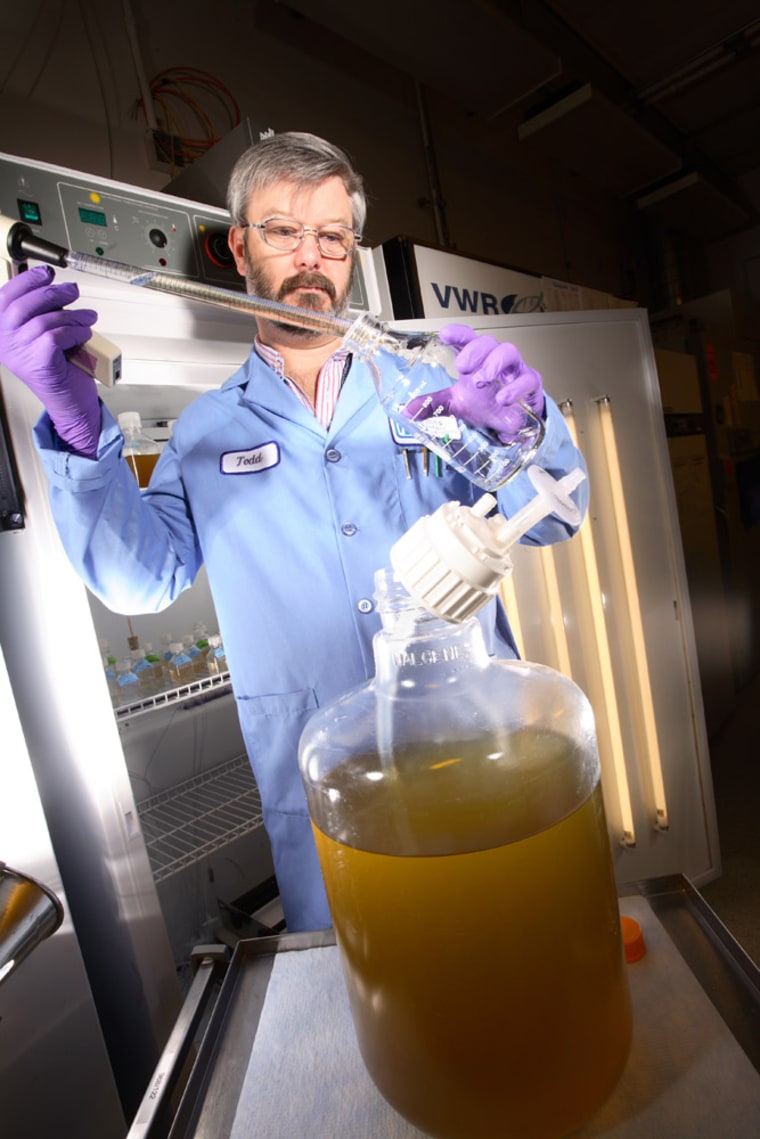A California company and a Department of Energy research lab have announced that they're teaming up to make oil out of algae — a potential fuel source that would be low on greenhouse gas emissions tied to warming.
LiveFuels Inc. says it will fund dozens of projects at Sandia National Laboratories with the aim of producing economically feasible "biocrude," aka biodiesel, by 2010.
Sandia's investment in related research goes back five years, says Grant Heffelfinger, a senior manager at the lab, providing time to build up expertise in "the challenge of understanding how and under what conditions" the process will work.
Algal oil is similar to soybean oil, which can also be used to produce biodiesel, but can be grown on marginal lands unsuitable for food crops and even in brackish water, LiveFuels said.
The company estimates that all U.S. oil imports could be replaced by biocrude grown on 20 to 40 million acres of marginal lands that exist across the country.
Sandia spokesman Mike Janes echoed that view. "Recent studies using a species of algae show that only 0.3 percent of the land area of the U.S. could be utilized to produce enough biodiesel to replace all transportation fuel the country currently utilizes," he said.
"In addition, barren desert land, which receives high solar radiation, could effectively grow the algae, and the algae could utilize farm waste and excess carbon dioxide from factories to help speed the growth of the algae."
Prices still prohibitive
But not any algae will work. The cost-effective kind — as in making biocrude for less than $60 a barrel — is high in fats.
Commercially grown algae like Spirulina are high in protein and starch but low in fat. A few high-fat species of algae are promising, LiveFuels said, but the fats — at prices around $1,200 a pound — are cost prohibitive.
"'Fat algae' doesn't sound like a biocrude oil feedstock, but the petroleum we use today is derived from prehistoric biomass (including algae)," LiveFuels said in a statement announcing the joint venture. "Nature's biomass decomposition process occurred over millions of years under conditions of enormous heat and pressure. Much of the petroleum we use today began some 200 million years ago in the Carboniferous Period. The deposits of oil pumped from the North Sea, for example, consist partly of decomposed haptophyte algae called coccolithophorids."
"The challenge," LiveFuels said, "will be growing and transforming algae cheaply into biocrude within days rather than millennia."
LiveFuels Chief Executive Officer Lissa Morgenthaler-Jones says her company hopes to "grind down costs" across the process — from finding the right strains, to harvesting and final production.
"Other countries are ahead of the U.S. in biocrude research, but other countries were once ahead of us in the space race too," she said in announcing the venture. "America put a man on the moon in eight years, and America can make its own biocrude in four."
Greenhouse, biodiesel benefits
Janes said that algae offers environmental benefits in terms of greenhouse gases and as a more efficient fuelstock than biodiesel from crops like soybeans.
“The amount of greenhouse gasses generated are relatively small since most of the carbon dioxide emitted during the burning process is simply recycling that which was absorbed during plant growth," he said.
As for other biodiesel sources, Janes said that "a complete transition to biofuels could require boundless amounts of land if traditional crops are used."
But algae breaks that barrier. "With an oil-per-acre production rate 250 times the amount of soybeans," he said, "algae offers the highest yield feedstock for biodiesel."
